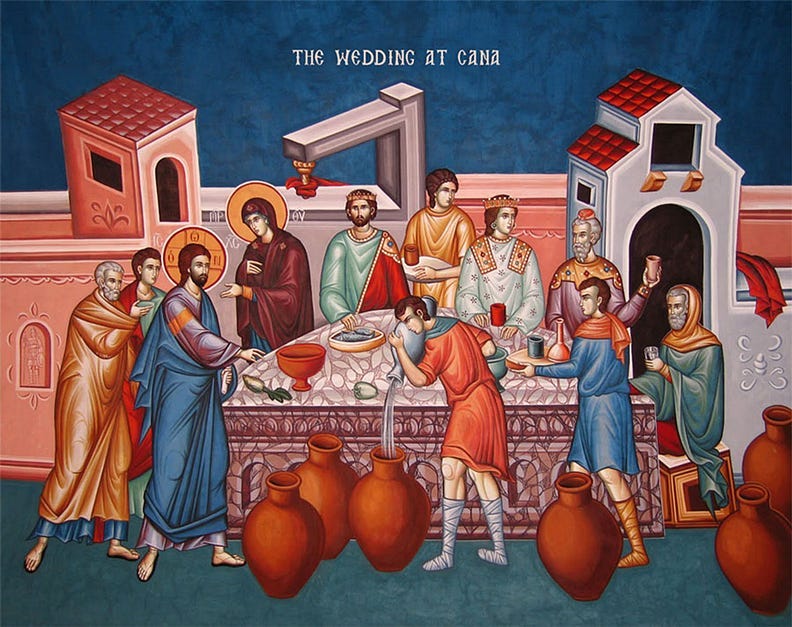Why are there no Vows in an Orthodox Christian Marriage Sacrament?
The sacrament of marriage bears witness to God’s action in joining the couple together.
The sacrament of marriage bears witness to God’s action in joining the couple together.
By: Theodora Dimitrijevic
The sacrament of marriage bears witness to God’s action in joining the couple together. It is God’s action — His proactivity in the lives of the couple from arranging their first meeting to leading them into the marriage union that is celebrated.
As the marriage ceremony in Orthodox Christianity is in reverence of God’s hand in the lives of the man and woman, there are no vows. Simply, vows (promises) are not needed to be made. The making of promises that humans can keep is not how Orthodox Christians think about marriage. It is not the promise of what you will always do for your spouse but the reliance on God’s wisdom and providence for all of your marriage’s needs that will take you through your marriage.
It is also important to note that marriage is a vocation and much more than a socially acceptable tradition, a longstanding social tradition or social norm. In that same thread, marriage is not the joining of finances or family assets such as properties and monetary savings to live more comfortable lives.
Marriage is entered into because of a calling from the Holy Spirit — as is the priesthood and monasticism, other vocations in Orthodox Christianity. I would also like to take a moment to state that the vocations of priesthood and marriage are not exclusive from one another in the Orthodox Church. A man can have two vocations in Orthodox Christianity in which one is to be married and the other is to be a priest. Unlike Catholicism which bars men from entering into both priesthood and marriage, the Orthodox Church embraces the coexistence of marriage and priesthood with the only condition being that a man enter into marriage prior to his ordination to the priesthood.
As marriage is a vocation, you may be wondering what exactly the married couple are called to accomplish in their marriage. We have already established that marriage is not entered into for the combining of resources to live a more comfortable life than one would live while single or for the upholding of tradition. The purpose of marriage and what the couple are called to accomplish is to help one another enter the Kingdom of God where they will once again join one another.
Marriages last forever in the Orthodox Christian Church. The Orthodox Christian Church is also not only the Orthodox Christian Church established here on Earth but also includes the Church in the Heavens made up of the faithful. As spouses seek to be joined in the next life for the continuation of their lives together, the words ‘Till death do us part’ which exist in western marriage ceremonies do not exist in the Sacrament of Orthodox Marriage. Death is the eternal separation of people which Orthodox Christians do not believe in due to the Resurrection of Christ which forever changed marriage.
With Christ’s Resurrection, marriage became eternal — a union not only for one’s life on Earth but also for one’s life in the Kingdom of God. The vocation of Orthodox Christian marriage is for one to help their spouse enter Paradise with them. Spouses need to provide spiritual encouragement to one another. It could mean sharing a Bible verse or a Psalm with one’s spouse that will speak to their situation in a time of struggle. Since spouses are closer to each other than anyone else, they have the unique ability to be especially helpful in aiding one another on their journey to Paradise. By extension, God may bless the couple with a child or children so that their lives are also shaped by the couple’s spiritual encouragement to one another and thus, spiritual encouragement even extends beyond the lives of the man and woman and salvation reaches new lives through marriage. If a couple cannot bear children, marriage is still worth entering into because the salvation of the couple can still be achieved through a marriage without children just as it can be in a marriage with children. The marriage without a child or children still continues in Paradise just the same as a marriage with a child or children.
With Christ’s coming to Earth, the first miracle of Christ was performed in the wedding at Cana. Since there are no coincidences, this can only mean in regards to marriage that Christ came to change marriage.
In the wedding at Cana, the wedding party runs out of wine and Christ instructs that the pitchers are filled with water which He turns into wine. In His first miracle, Christ shows that He came to change marriage from something ordinary into something extraordinary. This miracle also is a testament to God’s presence in marriage and shows that God is willing to intervene at even the first sign of hardship in a marriage to restore harmony to marriage.
Follow for more on Medium: https://medium.com/@Theodora.Writes





